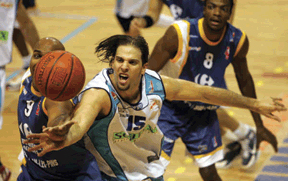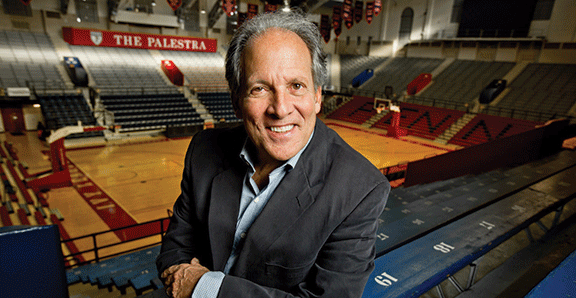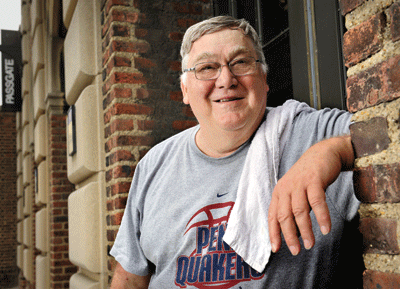
Geoff Owens C’01 returned home from an away game in November 2001, hoping to relax. But when he flipped the light switch at his apartment in the Polish town of Inowroclaw, he was left in the dark.
“I had no lights, no TV, nothing,” recalls Owens, who was a rookie in Poland’s top basketball league when the incident occurred. “I sat in the dark and thought: What in the world? It was Saturday night, and nobody works on the weekend. So I had to wait until Monday to get my power turned back on.”
Owens now plays for Mulhouse in the French Pro B League after stints in Poland and Turkey, and he is hardly the only Penn alumnus playing professional basketball outside the United States. In fact, there are enough former Quakers to staff a couple of highly competitive teams. They come to Europe for a variety of reasons: working on their game in hopes of making the NBA; using basketball to experience a different culture; or just earning money by playing the game they love. The rewards are considerable; so are the challenges.
Two-time Ivy League Player of the Year Ugonna Onyekwe W’03, for example, started his professional career in 2003 on a frustrating note. After being cut by the New York Knicks prior to the NBA pre-season training camp, he thought he should have received a better offer than being the main man for Léon Caja España, a second-division team in Spain.
“I thought if I couldn’t play in the NBA that I could have played at the highest level in Europe,” says Onyekwe. “But having looked at everything, I decided to just take the hit for the year and try it. My agent and I looked at the whole picture—not just the money and the team, but also the freedom to improve as a player, since I was the focal point.”
Asociación de Clubs de Baloncesto (ACB), the top Spanish league, is widely considered the strongest league outside the NBA. But the Spanish second-division league, Liga Española de Baloncesto 1 (LEB1), is a step down.
After spending the following season at Ciudad de Huelva—also in the LEB1—Onyekwe has landed a starting position with Bnei Hasharon of the stronger Israeli Premier League, which features two-time reigning Euroleague champions Maccabi Tel Aviv and Hapoel Jerusalem.
“I had other offers in Spain, Germany, and France,” Onyekwe recalls. “But at the end of the day, this team had a pretty young nucleus, and I would go out and play a lot of minutes and again be a focal point of the team. And the league is great—with a high level of competition. I definitely think it’s a step up.”
The 26-year-old Onyekwe is still determined to make the NBA. “I will look at the situation next summer,” he says, “and if I have a legit chance [of making an NBA team in training camp] I will go—regardless of what I have in Europe. The NBA is always going to be my first goal.”
Koko Archibong C’03, who helped Penn to three Ivy League titles, is also working on his game in hopes of eventually making the NBA. The 2003 graduate has used his defensive prowess to help Pau-Orthez to the 2004 French League crown and Bamberg to the 2005 German League championship.
“I think I could help an NBA team right now,” says Archibong. “I think I could be there and contribute. But that’s not my decision. My main strength is at the defensive end. I take pride in shutting down the best player on the opposite team. That’s an asset regardless of the team. But I definitely don’t think I’m a finished product at this time.”
While he works on his game, Archibong is also enjoying having former Palestra running mate Tim Begley W’05, the 2005 Ivy League Player of the Year, as a teammate in Bamberg. Archibong played a key role in helping Begley get the job in Germany.
“An agent approached me about Tim,” Bamberg coach Dirk Bauermann recalls. “I looked at tape, and I liked the way he played. Obviously, at that point I called Koko and … he said he was just thrilled about the opportunity to play with Tim again.”
Most American players have to cope with homesickness, language barriers, strange food, and crazy driving, among other challenges. Archibong—who still remembers his initial difficulties when he first went to France in 2003—made sure it would be easier for Begley when he arrived in Germany.
“One of my main goals was trying to keep Tim from feeling that same culture shock,” Archibong says. “I tried to keep his mind occupied so he didn’t feel alone.”
Jeff Schiffner C’04, who helped Penn win two Ivy League crowns, says he loves being in Europe and experiencing its differences—some of which are striking.
“We’re in the locker room after a game and some guys light up a cigarette,” notes Schiffner, who plays for reigning Portuguese champions Queluz Sintra after capturing the championship in Denmark last season with the Skovbakken Bears. “That’s the first time you really know you’re in Europe.”
The money in Europe is usually about double what players earn in the U.S. minor leagues. And the European lifestyle tends to be more laid-back, allowing people to enjoy their free time more.
“People here work to live. In the U.S., they live to work,” says Schiffner, adding that Americans could learn a few things from Europe, including the way it takes care of needy people.
One positive aspect of the American lifestyle, as many Penn alumni have realized, is the networking of former students. “We have a nice network of Penn players over here,” says Schiffner. “You don’t see that in the Ivy League a lot.”
After being cut late in the Boston Celtics pre-season camp in 2000 (months after being named the Ivy League Player of the Year), Michael Jordan C’00 left for France with hopes of starting a professional career. He returned to Philadelphia just a week later after experiencing what he describes as “personal problems” with the club. He helped out for a while with the Penn JV program and eventually played a month for a third-division club in Germany, before finishing the season in the now-defunct International Basketball League.
But a call by former Quakers big man Matt White C’79 WG’83 helped jumpstart Jordan’s career. White had played in Spain in the early 1980s and assisted Jordan in landing with Etosa Murcia, a team in the Spanish second division.
Jordan again got Quaker help when current Penn assistant coach Matt Langel W’00 gave him the tip for his next job with the Quakenbrueck Artland Dragons in Germany. Langel, who played two years in Holland, had tried out with Quakenbrueck, but was unable to reach an agreement with the team. Soon, however, he learned that they were looking for a point guard—a perfect match for Jordan, who after three years there moved to the BK Ventspils in Latvia and then back to a German team, RheinEnergie Koeln.
Other Penn graduates playing in Europe include two-time Ivy League Player of the Year Jerome Allen W’01, who is in Italy after playing 117 games in the NBA and hitting jumpshots in Spain, France, and Turkey; Jan Fikiel W’05, back in his native Germany for second-division Schalke; Conor Tolan C’05, who’s home in Ireland playing for Dublin’s Dart Killester; and Adam Chubb W’04, who signed with the Giessen 46ers in Germany.
Now and again some of the former Quakers encounter each other on the courts of Europe. This past October, for example, the Bamberg team of Begley and Archibong hosted Schiffner’s Queluz club in a pre-season tournament.
“It’s really funny for us,” says Begley, who played with Archibong and Schiffner two seasons at Penn (2001-02 and 2002-03). “All three of us are so happy to be getting paid to play basketball. It’s a dream we’ve all had since we were little kids. For [us to] have a couple moments to share that together is just too good to be true.”
Schiffner smiles when he thinks about his life in Europe.
“I think of it as an opportunity to see the world,” he says. “I can stay in touch with my friends with the Internet and telephone, and I don’t think they’re doing anything I am really missing. My job is to play basketball. And that is pretty special.”
—David Hein




